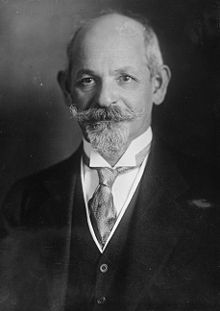Daniel Blumenthal
Daniel Blumenthal (born January 25, 1860 in Thann ; † March 25, 1930 in Paris ) was a lawyer , mayor and member of the German Reichstag .
Life
Daniel Blumenthal was the son of a rabbi from Teltze ( Galicia ). In 1858 he immigrated to Alsace, where he converted from Judaism to the Protestant faith and worked as a Bible colporter . Daniel Blumenthal attended grammar school in Mulhouse until he graduated from high school.
From April 1, 1880, he did military service as a one-year volunteer . It was noticeable that the whole family had Russian citizenship and not German . On October 19, 1882, Daniel Blumenthal was naturalized as a German .
After his military service, he studied two years at the pin to St. Thomas in Strasbourg and then at the University of Strasbourg jurisprudence . From 1886 to 1901 he was a lawyer at the Regional Court in Mulhouse and from 1901 at the Colmar Higher Regional Court .
In July 1895 he founded the democratic Alsace-Lorraine People's Party in Mulhouse and was elected its first chairman. He was a co-founder of the daily newspaper of the same name in Colmar . Since 1899 he was a member of the Colmar municipal council and since 1900 representative of the canton Colmar in the Upper Alsatian district assembly (until 1914) and a member of the state committee.
From 1903 to 1907 he was a member of the German Reichstag for the constituency of Reichsland Alsace-Lorraine 9 ( Strasbourg-Land ) and the German People's Party . In the Reichstag election in 1907 he entered the constituency of Alsace-Lorraine 9 (Strasbourg-Land) and the constituency of Alsace-Lorraine 3 (Colmar). In constituency 9, he achieved second place in the first ballot with 7,022 votes, after Dionysius Will , who had received 8,967 votes, and ahead of the Social Democrat Richard Fuchs with 3,993 votes. In the second ballot, Dionysius Will was elected with 10,252 votes and Blumenthal, who was able to unite 9,255 votes, lost his constituency. In the Alsace-Lorraine 3 constituency, too, he achieved second place in the first ballot with 5,692 votes, behind mandate holder Jacques Preiss , who received 7,883 votes. The social democrat Jacques Peirotes was eliminated as third with 4,515 votes. In the second ballot, Jacques Preiss prevailed with 9,627 against Blumenthal with 7,951 votes and was elected.
On June 24, 1905, he was elected Mayor of Colmar with 15 of 29 votes and held this office until 1914.
Daniel Blumenthal was unsuccessful in the election to the 2nd Chamber of the Landtag of the Reichsland Alsace-Lorraine on October 22, 1911, but was appointed a member of the first Chamber by the Emperor.
After the beginning of the First World War , he moved to Paris and became a member of the Conference d'Alsace-Lorraine , which prepared the reintegration of the country into France. In 1917 his propaganda book Alsace-Lorraine was published , in which he presented Alsace-Lorraine as a country whose population was longing for the liberation by France. On behalf of the French government he was sent to the United States to advertise there. Daniel Blumenthal boasted that he had convinced Woodrow Wilson to drop the call for a referendum in Alsace-Lorraine on future status.
After Alsace-Lorraine was reintegrated into France, he was appointed to the Conseil Supérieur d'Alsace et de Lorraine in 1919, to which he belonged until 1920. He advocated radical assimilation of the country. He was particularly hated in Catholic circles for his anti-clerical stance. His attempts for the Radical Party to be elected to the Chamber of Deputies in 1919 and 1924 and to the Senate in 1920 failed. The Radical Party excluded him in 1924.
A street in Colmar is named after him.
literature
- Hermann Hiery : Reichstag elections in the Reichsland. A contribution to the regional history of Alsace-Lorraine and the electoral history of the German Empire 1871–1918 (= contributions to the history of parliamentarism and political parties. 80). Droste, Düsseldorf 1986, ISBN 3-7700-5132-7 , pp. 450-451, (also: Freiburg (Breisgau), University, dissertation, 1984).
Web links
- Daniel Blumenthal in the database of members of the Reichstag
- Daniel Blumenthal's biography . In: Heinrich Best : database of the members of the Reichstag of the Empire 1867/71 to 1918 (Biorab - Kaiserreich)
Individual evidence
- ^ Carl-Wilhelm Reibel: Handbook of the Reichstag elections 1890-1918. Alliances, results, candidates (= manuals on the history of parliamentarism and political parties. 15, 2). Half-volume 2. Droste, Düsseldorf 2007, ISBN 978-3-7700-5284-4 , pp. 1531-1534.
- ^ Statistical yearbook for Alsace-Lorraine. Vol. 3, 1909, ZDB -ID 217972-6 , p. 276.
| personal data | |
|---|---|
| SURNAME | Blumenthal, Daniel |
| BRIEF DESCRIPTION | German lawyer and politician, MdR, mayor |
| DATE OF BIRTH | January 25, 1860 |
| PLACE OF BIRTH | Thann |
| DATE OF DEATH | March 25, 1930 |
| Place of death | Paris |
